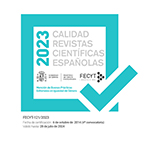Looking at the sea. Visual tropes of resilience and overcoming in covid-19
Abstract
Situations of collective crisis, such as those caused by wars and natural catastrophes, produce the activation of an extensive visual imagery that allows the articulation of the tragedy storytelling. Medias use pre-established visual tropes to form and create the visualization of events, harnessing both the symbolic and narrative potential of those visual stories that have previously proven effective. The exceptionality of covid-19 has allowed the gestation of new visual metaphors that, if they take effect, will be incorporated into the inventory of resources from which the press draws. In this research, the creation of a photographic trope that we have named 'resilience trope'. It has been investigated through the case study and interviews. The analysis has made possible detail the settlement process of a set of visual topics that, on a recurring basis, photojournalist have replicated, adding in each new instance they made, new elements that expanded their significance. The media have welcomed the new trope and quickly added it to the news flow. The trope will settle definitively if, in future crisis situations, it is recovered and used again.
Downloads
Article download
License
In order to support the global exchange of knowledge, the journal Arte, Individuo y Sociedad is allowing unrestricted access to its content as from its publication in this electronic edition, and as such it is an open-access journal. The originals published in this journal are the property of the Complutense University of Madrid and any reproduction thereof in full or in part must cite the source. All content is distributed under a Creative Commons Attribution 4.0 use and distribution licence (CC BY 4.0). This circumstance must be expressly stated in these terms where necessary. You can view the summary and the complete legal text of the licence.










